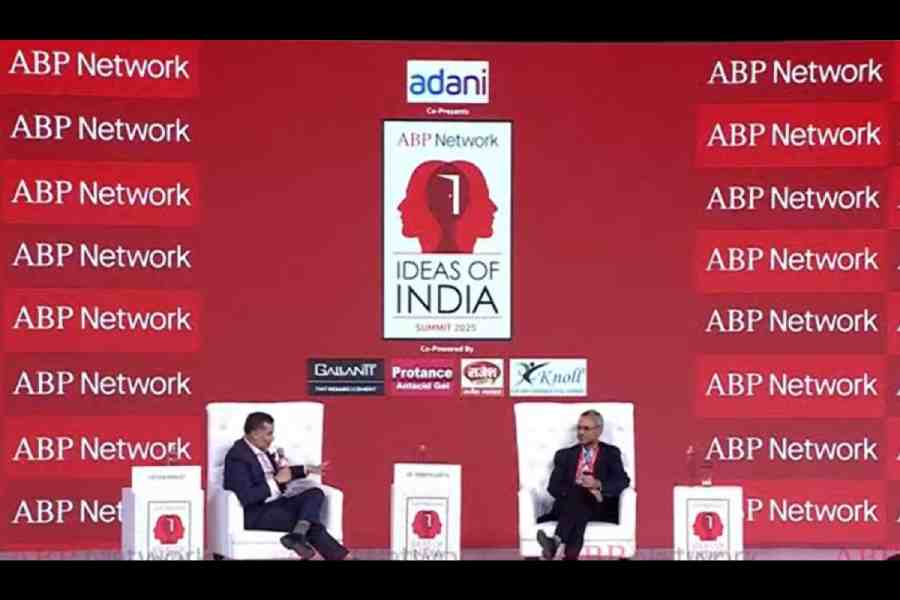Artificial intelligence that perpetuates the same biases as humans. Sitting still in a world accelerating at a furious pace. The homecoming of Sunita Williams.
A conclave with some of the era’s most influential thought leaders to dissect the ideas shaping an ascendant India and the world began in Mumbai on Friday.
ABP Network’s Ideas Of India Summit 2025 has scientists, best-selling authors, politicians, industrialists and filmstars among the speakers. The theme — “Humanity’s Next Frontier”.
The man who leads one of the planet’s leading AI hubs spoke of a fundamental problem that AI models are grappling with — bias.
“Why bias? Because it learns from data created by humans and we humans have those biases,” said Manish Gupta, senior director, Google DeepMind, a research lab that develops AI systems.
Gupta was in conversation with Chetan Bhagat, author and columnist. Gupta’s critique was prompted by a question from Bhagat, one that resides inside many of us.
“Does AI have morality? If the data itself is biased, if people think in a biased way, how will AI be fair, moral or just?” Bhagat asked.
A “very tricky” problem, said Gupta.
He cited the example of a human flaw in an AI model meant to shortlist candidates for a hi-tech job. “All you do is change the name from a male to a female; everything else in the resume stays. Suddenly, your chances of getting shortlisted go down dramatically. Where did that AI model learn from? It learnt from us, humans, who carried those biases.”
Companies have started detailed audits to tackle the challenge, he said. “My own team has been doing a lot of work on these bias issues in a non-Western context. Bias based on caste, religion and so on that these models carry. We are working on techniques to mitigate those biases.”
Author, journalist and travel writer Pico Iyer addressed the inaugural session before he was in conversation with Shashi Tharoor, politician, author and former diplomat.
Iyer said silence and solitude were imperative to deal with a world moving ahead at breakneck speed.
“We all know that the world is accelerating at a furious pace. My prejudice is that humans were never meant to live at a pace determined by machines.... It is only by stepping away from the tumult of the world that you can begin to do justice to it and see the larger picture,” said Iyer.
“I have never seen a world as divided as right now....One reason why I stress silence is that it is available to everybody; it is non-denominational and I think it sits on the far side of our ideologies and ideas.”
Iyer recounted his life in a catholic hermitage after a fire devoured his family home in California.
“The very night I lost everything when my house burned down, I realised I still had the most important things. I also realised I don’t need 90 per cent of the things I accumulated; I can live more minimally.”
Iyer’s new memoir, Aflame: Learning from Silence, which is based on that experience, will resonate with families in southern California, who have lost everything in the recent wildfires and have to rebuild their lives from the ashes.
In his welcome address, Atideb Sarkar, chief editor of the ABP Network, outlined the contours of the summit.
“A new frontier beckons. Artificial intelligence has brought expertise within the grasp of billions; data mining can solve problems like assessing the risk of disease; a second space race is underway, India is in it; scientists are exploring the possibility of eternal life. What’s holding us back? Ourselves,” he said.
“Many fear that AI will make the human race redundant, or worse, extinct. Political and non-state actors are mining our online data to spread disinformation.”
After the “big questions”, he dwelt on some answers.
“AI must be regulated in the public interest; citizens should use data mining tools to identify forces of disinformation,” he said.
Sarkar called for “leadership, collaboration and a little common sense”.
“Humanity needs to renew the human spirit. That will take us to the next frontier,” he said.
Another session saw Goutam Chattopadhyay, senior scientist at Nasa’s Jet Propulsion Laboratory and visiting professor at the California Institute of Technology, dismiss “conspiracy theories” about Sunita Williams, one of Nasa’s two astronauts stuck in space.
“There is no conspiracy here. Nasa is not keeping Sunita Williams in space. Sunita Williams’s return was delayed because of a technical glitch, but on March 19, they will be safely back home. In fact, we are using this opportunity to explore space further,” said Chattopadhyay, who traces his roots to Konnagar in Hooghly.
An all-women panel — Pratima Murthy, director, National Institute of Mental Health and Neurosciences (NIMHANS); Shubha Tole, neuroscientist and professor at the Tata Institute of Fundamental Research; and Jahnavi Phalkey, founding director of Science Gallery, Bengaluru — discussed the “Frontiers of Science”.
Pramod Sawant, chief minister of Goa; Calcutta boy Shashwat Goenka, vice-chairman of the RP-Sanjiv Goenka Group; Geentanjali Vikram Kirloskar, chairperson and MD of Kirloskar Systems; Mayank Agarwal, CEO, Gallant Group of Industries; actor-director Amol Palekar; actors Taapsee Pannu and Bhumi Pednekar; and chef Ranveer Brar were among the other speakers on the first day of the summit.
Kurt Volker, former US special representative for Ukraine negotiations, discussed “the new world order” with Congress MP Shashi Tharoor in the penultimate session. An evening session featuring singer-composer Papon saw the banquet packed to the brim.










